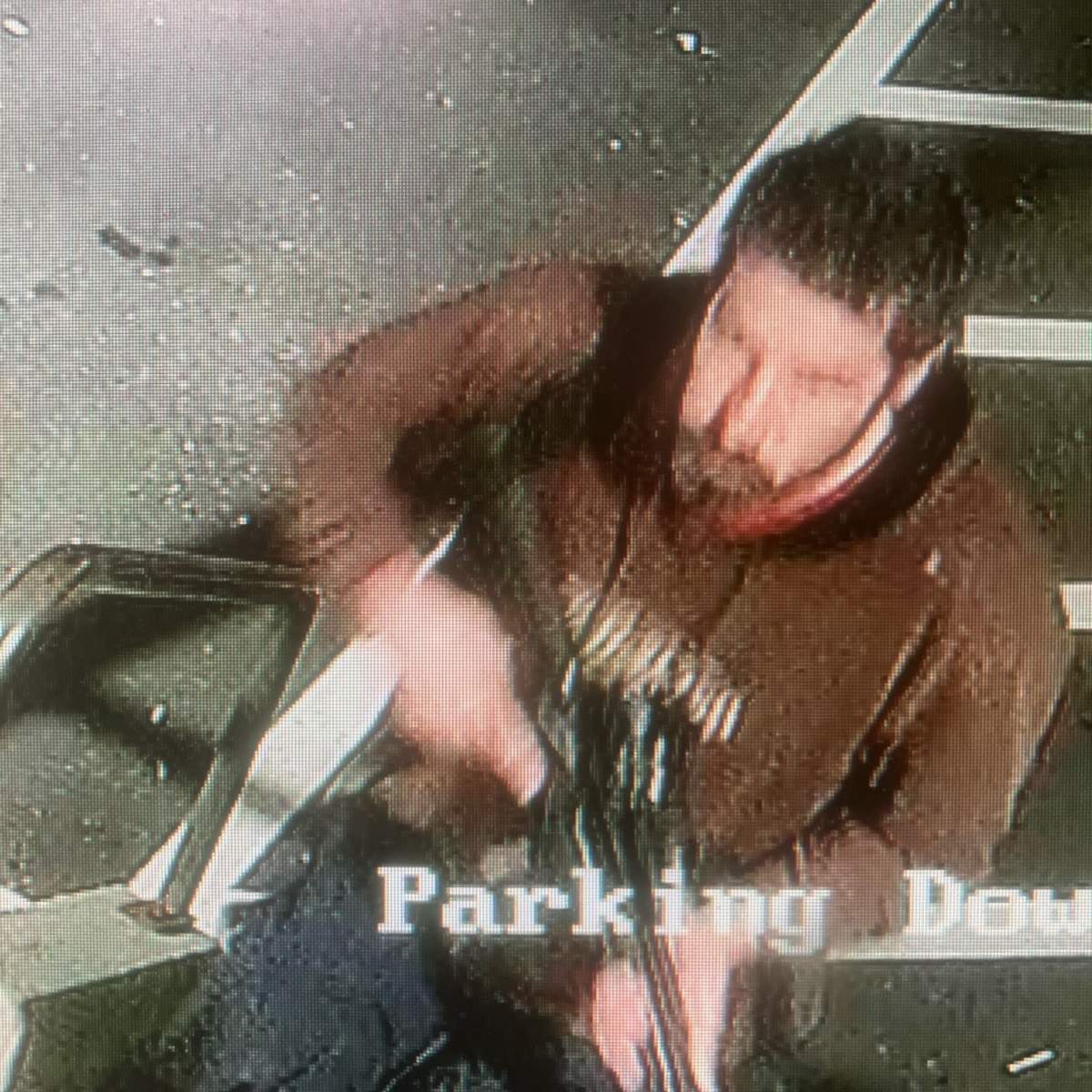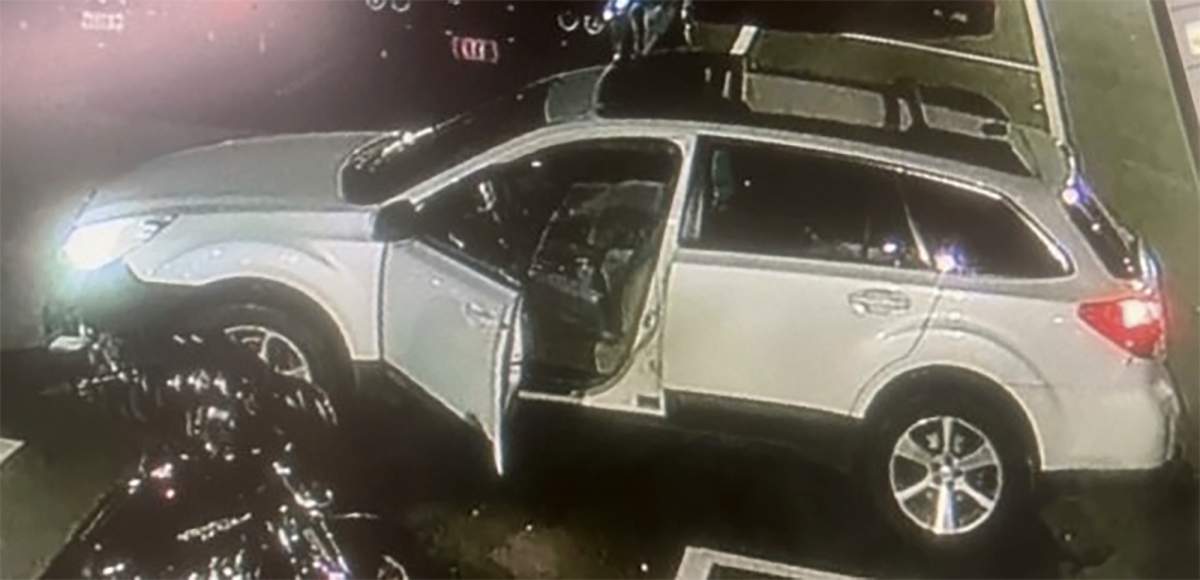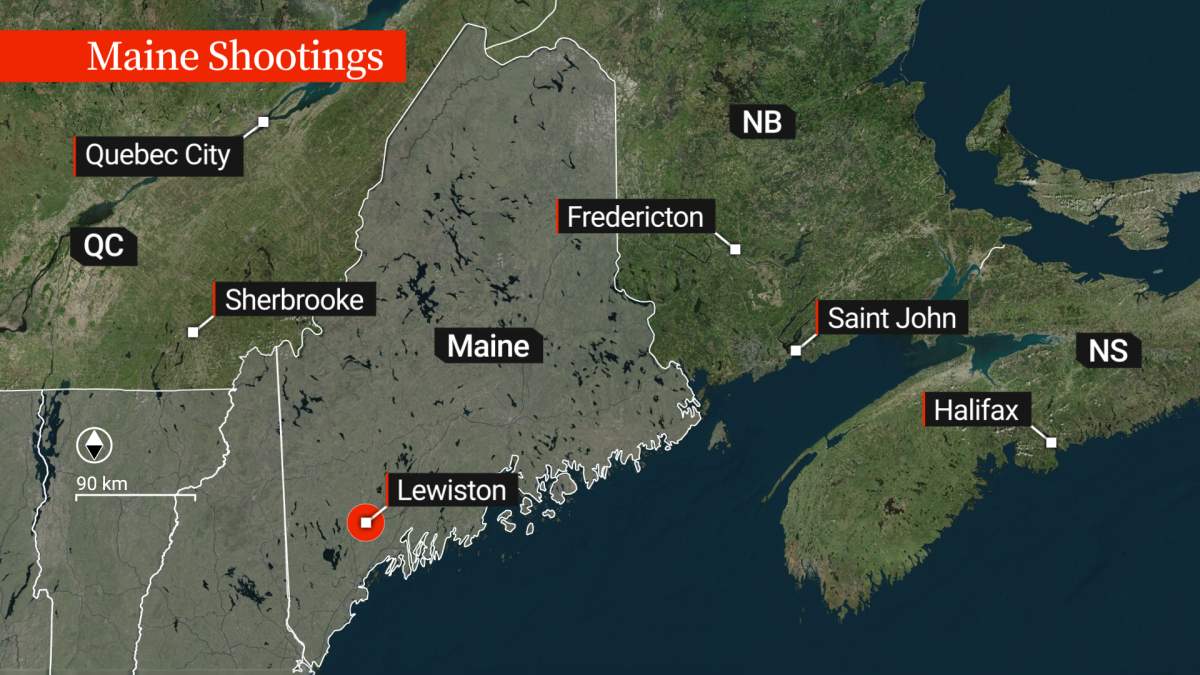Heavily armed police descended on neighbourhoods in and around Lewiston, Maine, Thursday night as they continued to search for the “armed and dangerous” suspect allegedly behind two separate mass shootings in the state the night before.

At least 18 people are dead and 13 others are injured after gun shots broke out at a bowling alley and a bar around 7 p.m. Wednesday in Lewiston, Maine – a roughly three-and-a-half-hour drive from the Canadian border.
As the search for suspect Robert Card entered a second full day, police surrounded multiple properties, including homes owned by his relatives outside Lewiston, and called out on loudspeakers for Card and anyone else inside to come outside.
“You need to come outside now with nothing in your hands. Your hands in the air,” police were heard shouting through a megaphone outside one home owned by Card’s relative near the town of Bowdoin, about 24 kilometres east of Lewiston.
Maine State Police said in a statement that law enforcement officials were executing “several search warrants” in the larger Lewiston area, and that the loudspeaker announcements were standard procedure “to ensure the safety of all involved.”
“It is unknown whether Robert Card is in any of the homes law enforcement will search,” police said.
By around 9 p.m. Eastern Thursday, police had stood down and left the search areas after it became clear Card was not inside any of the properties.
Police have told residents in the Lewiston area to stay in their homes while they search for 40-year-old Card, a U.S. Army reservist they initially described as a person of interest but who now faces eight murder charges.
“He should be considered armed and dangerous,” Col. William Ross of the Maine State Police told reporters Thursday.
“Based on our investigation, we believe this is someone that should not be approached. If you come into any contact with this individual, or someone that you think looks like this individual, you are to call 911.”
Ross added there were only eight murder charges right now as the remaining victims have yet to be identified, the process of which is ongoing.
Card was described in a police bulletin obtained by The Associated Press as a firearms instructor believed to be in the U.S. Army Reserve and assigned to a training facility in Saco, Maine.
The document about Card, circulated to law enforcement officials, said he had been committed to a mental health facility for two weeks in the summer of 2023, The Associated Press reported.

Get breaking National news
It did not provide details about his treatment or condition but said Card had reported “hearing voices and threats to shoot up” a military base.
Officials Thursday would not get into specifics given the ongoing investigation, and said they are focusing on finding Card. His whereabouts were not made known.
Police say they found a white SUV they believe Card drove to the town of Lisbon, about 11 kilometres to the southeast of where the shootings took place.

Greg Vecchi, a retired chief of the FBI Behavioral Science Unit and now director of training at SafeDefend, told Global News Thursday that searches like Card’s typically involve looking at databases, a suspect’s registration documents, their social media as well as interviews with their family.
“The biggest problem regarding time here is just … gathering the resources and the time it takes to analyze and then react based on what you find out, and then trying to coordinate all these various units and at the same time, trying to keep the public safe,” he said.
Vecchi added anyone in the area should pay close attention to anything suspicious and call police.
“If you think it might be a gunshot, assume it is and you need to act and not hesitate because hesitation can get you injured or killed,” he said.
A ‘dark day for Maine’
The bloodshed has rocked the largely rural state of Maine.
“This is a dark day for Maine,” Gov. Janet Mills told reporters at Thursday’s press briefing.
“I know it’s hard for us to think about healing when our hearts are broken, but I want every person in Maine to know that we will heal together.”

President Joe Biden ordered all U.S. flags to be flown at half-staff as condolences poured in from around the nation and at home.
Given Maine’s proximity to Canada, police in New Brunswick and Canadian border officials say they’re monitoring the hunt for Card.
The Canada Border Services Agency (CBSA) said Thursday that it’s working closely with Canadian and U.S. law enforcement “to ensure the safety and security of Canadians and protect Canada’s borders against any threat or attempt illegal entry.”
- U.S., Israel attack Iran as Trump urges Iranians to ‘take over your government’
- Read the full transcript of Donald Trump’s statement on Iran strikes
- Canadians urged to leave parts of Middle East as conflict risk grows: Anand
- Cargo plane carrying money crashes in Bolivia, killing at least 15 people, official says
CBSA senior spokesperson, Jacqueline Roby, said the agency had issued an “Armed & Dangerous – Firearms lookout,” which alerts border officers about the high-risk situation.
All points of entry remained open on Thursday. There are also multiple border crossings between Maine and Quebec, including the Armstrong-Jackman, Ste-Aurélie, and Coburn Gore-Woburn crossings.
Meanwhile, New Brunswick RCMP said they were “aware of the situation in Maine” and were monitoring it “in collaboration with our law enforcement partners.”
Woodstock Police Chief Gary Forward, who is also the president of the New Brunswick Association of Chiefs of Police, told Global News in an email that “all agencies are aware and working collaboratively in the event any outcome should unfold in the province.”
“Agencies in New Brunswick will continue to monitor and share information as it is received, while responding accordingly should the need arise,” he said.

Prime Minister Justin Trudeau told reporters in Ottawa on Thursday that the federal government was working to provide support where necessary.
“Our thoughts go out to our friends in Maine and neighbors in Maine who are suffering a terrible, terrible moment right now,” he said
“Of course, we have been engaged with our border services agencies and with appropriate police forces to ensure extra protections for Canadians.”
The shootings mark the 36th mass killing in the United States this year, according to a database maintained by The Associated Press and USA Today in partnership with Northeastern University.
Maine doesn’t require permits to carry guns, and the state has a longstanding culture of gun ownership that is tied to its traditions of hunting and sport shooting.
Keeping in mind the strong support for gun rights, lawmakers passed a “yellow flag” law in 2019 that would require police to seek a medical evaluation of anyone believed to be dangerous before then trying to take their guns away. However, critics charged that it was a weaker version of the tougher “red flag” laws that many other states have adopted.
— with files from Global News’ Rebecca Lau and Saba Aziz












Comments
Want to discuss? Please read our Commenting Policy first.